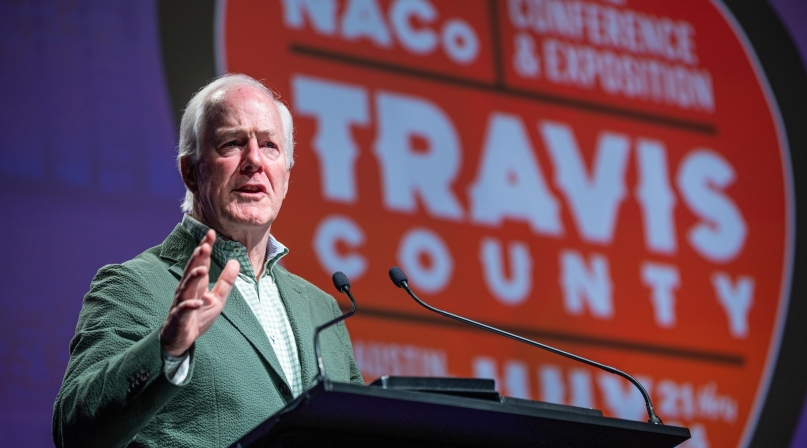Counties found a Senate ally in Cornyn

Key Takeaways
If anyone had the right consistency to understand the varied needs of counties, it was John Cornyn.
The fourth-term Republican Senator has represented Texas’s 254 counties since 2002, after hearing cases relating to county governments as a member of the state Supreme Court and serving as state attorney general. And his familiarity with the assorted situations counties face prompted him to co-sponsor legislation that will allow counties greater leeway for COVID aid spending.
Opening General Session
July 22, 2023
NACo Annual Conference - Travis County, Texas
“We’re as diverse as we are plentiful,” he said, noting he represented both the third most populous county (Harris) and 3,069th most populous (Loving). “I depend heavily on my friends and colleagues at the county level. I cannot be in all 254 counties at once, so I look to those local leaders to help me understand the challenges our collective constituents are facing and what the best way to respond is.”
After the American Rescue Plan Act split more than $65.1 billion among every county in the United States in 2021, local feedback helped him figure out how to continue making ARPA work even better for counties.
“Now we need the flexibility, because we just can’t spend it on the things we need the most. Over time, the greatest needs in many areas weren’t masks and testing sites, they were transportation and infrastructure that lost funding because of the severe strain on revenue caused by the pandemic,” he said. “That’s the beauty of this effort, it puts the decision-making back in the hands of the elected leaders that the American people trust the most.”
The Cornyn-Padilla Amendment, cosponsored with Sen. Alex Padilla (D-Calif.), passed as part of the fiscal year 2023 omnibus spending bill, but counties are awaiting long-overdue guidance from the Treasury Department as to exactly how they can spend and should report up to one-third of their ARPA allotments if they are spent on infrastructure projects. Cornyn suggested county officials ask their federal officials to help pressure the Treasury to follow through.
“I won’t quit fighting for answers, and I know you won’t either,” he said. “I know how much is riding on that guidance every day we’re moving closer and closer to the deadline for you to make decisions on how to spend that money where you can permissibly spend that money. There’s no reason why you and your county should be in limbo for more than 200 days after we signed. They need to get moving so you can put these critical projects into motion.”
He also recounted how the 2022 elementary school massacre in Uvalde County motivated his support for the Bipartisan Safer Communities Act and its $13 billion in expanded Medicaid coverage, mental health programming and school mental health services, along with new restrictions on firearms and strengthened protections for victims of domestic violence, as well as enhanced school safety.
“Our schools across the state of Texas…look very different from the elementary and junior high schools and high schools that I went to,” he said. “They are pretty tightly controlled as they need to be, unfortunately, under these circumstances. The school safety is critical, because no child should have to go to school worried about their safety, and no parent should have to send their child to school worried about their safety.”
Though he wasn’t speaking about the Safer Communities Act, which he reminded the audience was the largest investment in community-based mental healthcare in American history, Cornyn’s remarks about supporting ARPA and the CARES Act demonstrated how recent crises had changed his approach to government.
“If you told me when I went to the Senate then I would have voted for trillions of dollars in spending for anything, I would have said ‘You’re completely nuts.’ But here we were, trying to do our best to respond to this unprecedented virus and its consequences.”
Attachments
Related News

U.S. House passes final minibus funding package
Congress introduced the final FY 2026 Appropriations package, including key county priorities related to transportation, housing, health, emergency management and public safety

U.S. Congress passes minibus funding package
U.S. House and Senate appropriators passed a “minibus” appropriations package containing Fiscal Year (FY) 2025 Interior-Environment, Commerce-Justice-Science and Energy-Water spending bills.

Federal district court issues ruling preventing the federal government from imposing immigration compliance mandates on grant recipients
On November 4, a federal judge in Rhode Island ruled that the U.S. Department of Transportation cannot condition federal grant funding on a recipient’s cooperation with federal immigration enforcement efforts.
